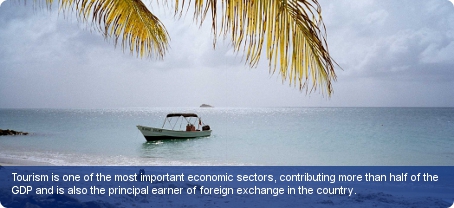Find a business in Antigua and Barbuda

Antigua and Barbuda is a small, developing country located in the Caribbean. Its economy is dominated by the services sector. GDP growth has fallen to -4.2% per annum in recent years (2008-12). Tourism is at the heart of Antigua and Barbuda’s economy and has been a successful sector over the past few decades contributing to a GNI per capita of US$12,480 (2012).
The largest contributors to GDP are Tourism and Financial Services which account for over three-quarters of the national economy. Tourism contributes directly or indirectly to more than half of GDP and is also the principal earner of foreign exchange in Antigua and Barbuda. It directly provides 5,000 jobs and 18% of total employment (World Tourism and Travel Council, 2011) because of the state’s position as one of the Caribbean’s premier tourism destinations. In the 1990s and 2000s repeated hurricanes and natural disasters damaged the industry, yet it still remains the dominant sector. The development of this industry has helped drive growth in the construction and telecoms sectors.
The agriculture and fishery sectors have dropped from 40 per cent of GDP in the 1960s to about 12%. Manufacturing industries, which thrived in the decade of the 1980s, are export oriented and produce garments, paint, furniture, bedding and galvanised sheets. Internet gaming is playing an important role in the diversification and expansion of the services sector. This is helped by the good internet speeds Antigua and Barbuda has.
The financial services sector is strong and growing. Banks include Canadian and British banks, and several regional and indigenous banks. Antigua and Barbuda’s banking sector is the second largest in the Eastern Caribbean region, accounting for one fifth of the region’s deposits, assets, and loans. The offshore jurisdiction was created in 1982 with the passing of the IBC Act, resulting in over twenty (20) years experience in offshore banking, insurance, international business corporations (IBCs), internet gaming and trust services.
The manufacturing industry is fairly small and only concentrates on light manufacturing because of the high cost of labour. Local manufacturers do have some access to the US, European, Caribbean markets. Antigua and Barbuda has no indigenous sources of oil, natural gas, coal or hydropower. The country is largely dependent on imported oil to generate electricity.
The deep water harbour located in the capital St John’s is the main transit point for trade and handles all the imported cargo. It is one of the most important freight hubs of the Caribbean. As an island state, Antigua and Barbuda place emphasis on shipping trade. The harbour also serves as a port for cruise liners. Around one third of the roads are paved and the VC Bird International Airport is located 8 km outside of St John’s.
Permits for new businesses can be acquired fairly easily and foreign investment is welcomed. A wide variety of languages are spoken but English remains the first language on the island state. The World Bank’s ‘Doing Business 2012’ study states that Antigua and Barbuda is a suitable country for foreign investment, as it is ranked 29th out of 183 in the category “Protecting Investors”.
Antigua is a member of the Eastern Caribbean Currency Union (ECCU). The Eastern Caribbean Central Bank (ECCB) issues a common currency (the East Caribbean Dollar) for all members of the ECCU. The ECCB also manages monetary policy, and regulates and supervises commercial banking activities in its member countries.
Compared to other Eastern Caribbean States, Antigua and Barbuda has one of the highest literacy rates in the region, with 98% among men and women (2008).



